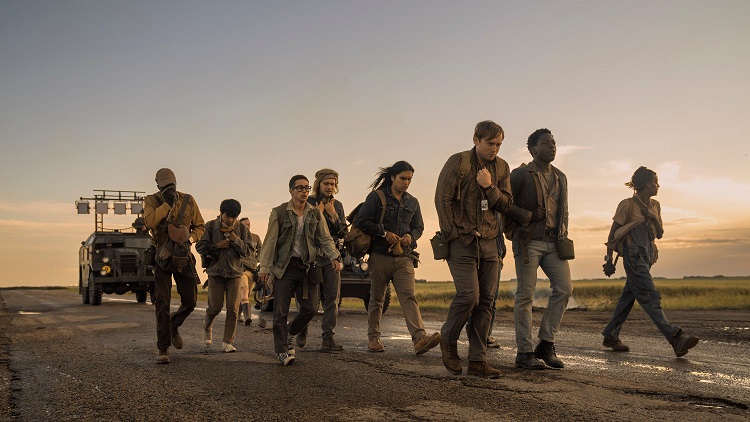The Long Walk is an action thriller adapted from Stephen King’s 1979 novel of the same name. Directed by veteran filmmaker Francis Lawrence—best known for box-office hits like I Am Legend (2007) and The Hunger Games series—the film features Cooper Hoffman, David Jonsson, Garrett Wareing, Ben Wang, Judy Greer, and veteran star Mark Hamill. With a trusted source material and an accomplished director at the helm, the question is: does The Long Walk bring something fresh to the genre?
Set in a post-war dystopia, the United States is ruled by a brutal military regime led by The Major (Hamill). To pacify a restless society, he stages a recurring national contest: fifty contestants, one from each state, must walk endlessly until only one remains. Breaking the rules or stopping means execution on the spot. Among the competitors are Raymond (Hoffman) and Peter (Jonsson), two young men from very different backgrounds. The real challenge isn’t only physical endurance, but also the fragile emotional bonds that form between the walkers.
Deadly competitions in dystopian futures are nothing new to cinema—Death Race 2000 (1975), Rollerball (1975), and The Running Man (1987) all carved their place in the genre, while modern franchises like The Purge and The Hunger Games echo similar tones. So why adapt The Long Walk only now? Perhaps because its story is far less glamorous, lacking the flashy brutality and extravagant staging of those predecessors. Its bleak, stripped-down realism feels closer to The Purge in spirit, grounded in settings that feel disturbingly plausible.
The film unfolds with a lean, relentless rhythm, rarely pausing. While it offers few “intense action” moments, its forward momentum keeps viewers hooked: who will survive, and how will it end? The narrative’s perspective is locked entirely to the participants—never the spectators—so the suspense grows organically from their limited view. Much of the drama lies not in spectacle but in dialogue, which steadily builds character dynamics. At times the repetition of the march can feel wearying, yet that exhaustion mirrors the contestants’ own suffering. The Long Walk is not a film for everyone—not because of its bursts of brutality, but because of its meditative, draining structure.
Francis Lawrence was an apt choice to direct, having already mastered similar material in The Hunger Games. Here, too, character relationships and psychological unraveling are central. Unlike the arena of Panem, though, The Long Walk is stripped down, more grounded and human. Endurance erodes body and mind alike, and the film leans on performances that must subtly convey that progressive decline. Lawrence keeps the visual palette varied enough—different landscapes, shifting light—to prevent monotony, while the actors effectively embody the mounting toll on body, psyche, and spirit.
Though thematically potent, The Long Walk isn’t the most powerful iteration of its message. Both The Hunger Games and The Purge arguably strike harder. Still, the film’s portrait of societal collapse under authoritarian control resonates sharply with our present climate. Cinema has always mirrored the anxieties of its time, and Lawrence’s adaptation continues that legacy.
In the end, The Long Walk is less about thrills than endurance. It lingers not through spectacle but through its reflections on resilience, morality, and the breaking point of human will. It may not be the flashiest dystopian thriller, but its stripped-back humanity ensures it leaves a mark.







